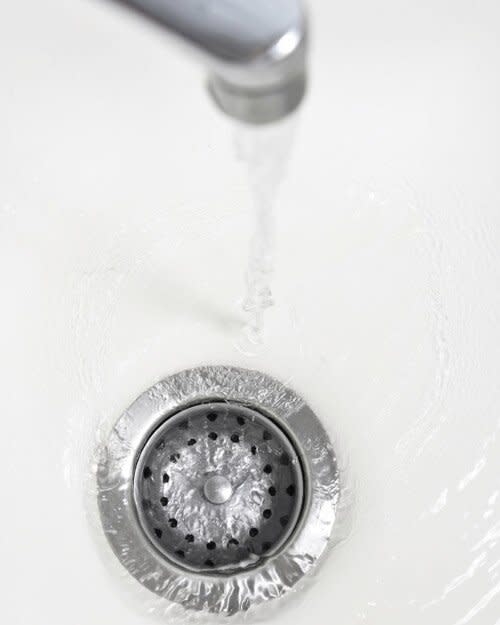How to Clear a Clogged Drain
TABLE OF CONTENTS
On This Page
Bathroom Sinks
Tub and Shower Drains
Floor Drains
Kitchen Sinks
There's nothing worse than hopping in the shower for a relaxing escape from a long day, only to look down and realize you're standing in a few inches of water. Another not-so-joyous moment? When your garbage disposal calls it quits and your sink backs up with not only water but chunks of food, too. Whatever the case may be, one thing's for sure: Clogged drains are a major pain. But that doesn't always mean you need to get your plumber on the phone. Here's how to tell which clogs can be remedied by a novice, along with tips on how to tackle them without the help of a professional.

Bathroom Sinks
Bathroom sink clogs can be caused by any number of things, including hair, hardened toothpaste, and fallout from shaving. Luckily, they're typically one of the easier blockages to tackle. "If you have a slow-draining bathroom sink, one of the simplest things you can do to clear it is mix up half a cup of baking soda and half a cup of white vinegar," says George Calabrese, the owner of Calabrese Plumbing in Fairfax, Virginia. "Pour it down your drain, let it sit, and follow with a couple quarts of boiling water." He says it might take a few rinses over several days to fully clear out, but with each pass of the solution, the water should drain faster.
However, if you find that your blockage isn't budging at all over a long period of time—we're talking hours, not minutes—Calabrese urges you to put your pride aside and call up a pro to prevent it from getting worse.
Tub and Shower Drains
The main culprit in these situations is hair, especially longer styles. "There's usually a cross under the drain stopper where hair tends to get stuck," Calabrese explains. If you can easily remove the drain stopper, he says that you can typically extract the blockage in just a few minutes with the help of needle nose pliers. (Tweezers work, too, just don't use them on your face without cleaning them first). On the other hand, if you remove the drain stopper and don't see a wad of hair in plain sight, it may have sunk into the depths of the pipes, making for a more difficult clog. While your first inclination may be to pour Drano down the hole and hope for the best, it's wiser to hold off. According to Calabrese, there are so many products out there that are chemical-based that either cause damage to the pipe system or end up burning your plumber when they go in to investigate.
Instead, he suggests keeping your home stocked with a tub of Bio-Clean. "It's made with an all-natural enzyme that introduces a good bacteria into the drain system and it won't hurt the pipes at all," he explains, pointing out that it's so clean that the inventor actually drinks it! "It takes time to work as it eats at the buildup that's in the drain, but it's also a fantastic maintenance product." With that in mind, Calabrese says that once your drains are open, you can use Bio-Clean once a week or every couple of weeks to help keep them that way, all without killing fish or hurting the environment as a whole.
Floor Drains
If you have a basement floor drain that's acting up, Calabrese says it's time to bring out the baking soda and white vinegar again—only this time with the help of a plunger. "Using a plunger can help because you can get great suction on a floor drain," he explains. Another option is to remove the floor drain grid altogether and shove a hose down it. "Take an old towel and a screwdriver and pack the towel around the hose so that the water doesn't squirt back out of the hole," Calabrese says, noting that this will create a DIY pressure washer for the drain.
Kitchen Sinks
The biggest causes of kitchen sink clogs are grease and food. That's why it's so important to scrape any crumbs off your plate and into the trash before giving it a good rinse. Many people believe that's what a garbage disposal is for, but Calabrese is quick to correct that flawed train of thought—as well as the idea that you don't need to rinse dishes before putting them in the dishwasher (another drain that can get clogged). Prevention aside, when it comes to clearing a kitchen sink clog, Calabrese recommends reaching for Bio-Clean or Dawn soap. "Grease is the number problem with kitchen sink drains and Dawn cuts through it like nothing else," he explains. If neither of those options does the trick and you notice that your drain is gurgling, Calabrese says it's time to dial up a pro.
